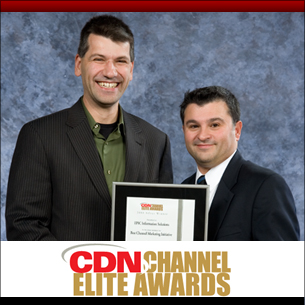LAS VEGAS – David Reid, the president and CEO of Winnipeg-based Epic Information Systems, sold his solution provider business last year to MTS for an undisclosed amount.
Reid later revealed that he received seven times the EBITDA (Earnings Before Interest, Taxes, Depreciation & Amortization) for Epic. Epic ranks No. 50 on the CDN Top 100 Solution Providers list with revenues between $20 and $30 million. You can do the math. But what makes Reid’s story so unique is that this sale did get a premium. Most solution provider sell-offs or mergers do not result in a happy ending.
So what did Reid do to net such an awesome return?

It all started eight years ago. Reid decided at that time he was going to get out of his solution provider business and began to educate himself on the process. He learned what buyers wanted in a seller, for example. He decided against hiring an M&A firm and instead leaned on his peer group at the VentureTech Network specifically the Mastermind group. Some in this group were already going through the sales process themselves.
Reid also took a deep assessment of his business and the industry. Reid learned that 60 per cent of solution provider businesses went out of business before the 10 year mark. Epic has been in business for 18 years. Epic employed 90 people and one of Reid’s priorities was to keep his staff safe. When Epic entered negotiations five per cent of Epic’s business was re-occurring revenue, 35 per cent was services and 65 per cent was product resale. Some of Epic’s strengths was that it’s profitable, had little debt and a strong management team.
Reid was faced with the prospect of transforming the business from a resale model to cloud and data centre business. “This was going to be a big capital investment and I did not want to take on another long term debt. It would be another 10 years before the investment would be paid off,” he said. And, approximately one in three mergers or acquisitions actually close.
The Compelling Event
What Reid realized was that there were strategic buyers in the marketplace who would be willing to pay a premium. However, these buyers are only interested in something they do not currently have. According to Reid, strategic buyers are not interested in market expansion. What they were interested in is something that is hard to build such as a data centre. So Reid’s plan was to create a synergistic opportunity with a buyer. “There has to be a compelling event to make this happen. You just to not ask to be acquired. I may have picked my buyer eight years ago, but it took eight years to bring us to a compelling event,” he said.
That compelling event happened to be a data centre. Epic was planning to build a substantial data centre for the Winnipeg market. Reid found out early that his cash reserves for the creation of the data centre were not going to be enough. His choices were to go further into debt or find a partner with deep pockets.
In 2012 Epic began its data centre quest and earmarked $10 million for the project. “It was not enough money,” he said.
Reid already had built a relationship with the old MTS Allstream, the high profile telecommunications company in Manitoba partnered with Epic to build a network operating centre in 2009. “Telcos like data centres, maybe they would want to partner with me or maybe they would help us build it and have us run it,” Reid said.
Reid informed MTS upfront that he wanted a premium for Epic and to his surprised they continued to talk.
“It was then that I knew I had a sale.”
Then came eight months of negotiations. “These things take time. There are many things that can cause delays,” he said.
Epic plans to open a $60 million data centre in 2015. It will have tier 3 uptime and one of the advantages it will have is in power and cooling. Reid said this data centre will get more than 300 days of free cooling because of the low year-round temperatures of the province.
Book value is bogus
Another thing Reid learned is that strategic buyers are not interested in your book value. What they do value is multiple re-occurring revenue streams. Some other keys in properly preparing your business to be sold is to eliminate debt, build EBITDA, and develop a positive cash flow. Make sure that any bonus money paid out to owners are clear because it may impact your profit statement.
Buyers will ask for a five year view of your budget so if you are thinking about selling a solution provider business this is a must have.

A strong senior management team is also coveted by strategic buyers. “Sometimes you have to make yourself redundant,” Reid said.
Contracts are looked upon by strategic buyers as “very important,” Reid said. “They have legal teams who are only happy to be sifting through your contracts. They find this work fun and they are ruthless,” he added. Reid suggested to make all your contracts digital.
To help him here Reid relied on the Mastermind group again and talked to accountants, did a mock contract to see what it would look like and to straighten out the tax implications.
Aftermath
So now the deal is done. What do you do next? Well in Reid’s case this was the actual hard part. He now had to tell his employees; most of them have been very loyal to Epic and with change comes uncertainty. Once again Reid leveraged his friends at the VTN Mastermind Group. He crafted a letter for his staff and rehearsed it with his peer group at Mastermind. He also was asked to stay on by MTS and therefore negotiated a three-year contract for himself. The fact that Reid was still going to be big part of Epic in the next three years made many of his employees happy.
“Some say I was lucky, but for me it was all about strategy and execution,” Reid said.
Article at:
How to sell a solution provider business for a premium | Computer Dealer News:
For additional information regarding Florida business sales, acquisitions and valuations, please contact Eric J. Gall at info@buysellflbiz.com or 239.738.6227. Also, visit our Florida Business Exchange website at www.fbxbrokers.com and my personal website at www.buysellflbiz.com.
No comments:
Post a Comment